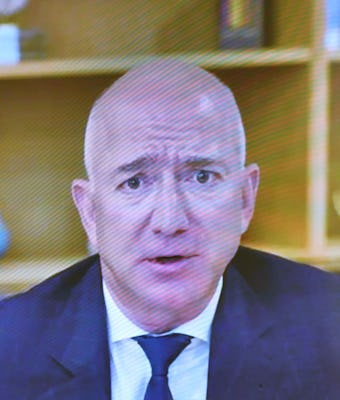Culture
Amazon used COVID-19 as an opportunity to overcharge for basic necessities

1,000%
How high Amazon inflated the prices of products in its marketplace in some cases.
A consumer rights advocacy group, Public Citizen, has come out with a blistering report on Amazon and its pricing practices during the ongoing COVID-19 pandemic. The 2.2 MB report offers a deep look inside how the company price-gouged desperately-needed products like antibacterial soap and toilet paper, according to the analysts. For example, a box of 50 disposable face masks went from the original price of $4 to almost $40 between April and mid-August.
The group notes that Amazon's practice of inflating the prices of these products would constitute a violation of price-gouging laws in various states in the United States, and that the company "misled the public, law enforcement, and policymakers about price increases during the pandemic."
Public Citizen suggests that Amazon's price inflation may have shot up to a whopping 1,000 percent on essential products. The report studied Amazon's own products as well as third-party vendor items, and it's not the first time the Jeff Bezos' market strategies and coronavirus response come to light. Between May and August, Public Citizen suggests that Amazon may have violated its very own Fair Pricing Policy. So far, Amazon has responded to Public Citizen's "Prime Gouging" report by claiming it has "no place for price gouging" and that "our systems are designed to offers customers the best available online price and if we see an error, we work quickly to fix it." But a quick look at Amazon's history paints a different picture.
How COVID-19 boosted Amazon's sales — It was the perfect disaster. As states in the country began enacting their various lockdown orders, millions of Americans found themselves at home worried about a viral outbreak and wondering how to experience some element of normalcy as basic products in the categories of food and hygiene rapidly ran out.
In the middle of this tense landscape, online sales shot up by 60 percent, according to Public Citizen. "Amazon’s second quarter earnings report, which covered the period beginning when most stay-at-home orders were first put in place, included a 40% increase in sales and a 100% increase in profits," the study notes.
As profits grew, its employees protested poor working conditions, potential exposure to the virus, and at least one Amazon worker in Staten Island, NY died due to COVID-19.
We've been here before — Exploiting consumer reliance during a crisis sounds gnarly but it's not entirely new for the company. During Hurricane Irma, watchdogs alerted Amazon about price gouging on its platform for items like bottled water. Its response was shockingly insensitive, even by Amazon's standards. According to Public Citizen, the company "took no action to address the problem, and encouraged customers to contact customer service if they have a complaint."
For now, Amazon insists that it will report these price gouged items to federal and state law enforcement, but a far more effective strategy would be to study its own marketplace and how Amazon itself seems to have enabled this environment of exploitation, and put an actual end to it. Unfortunately, the likelihood of that happening is nonexistent.